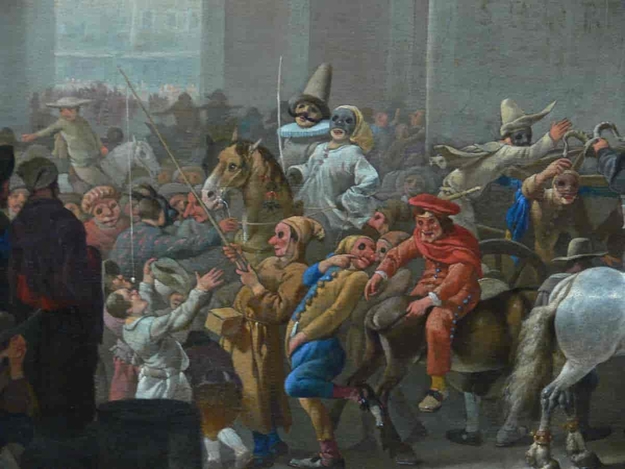"Carnival in Rome" by Johannes Lingelbach - by Johannes Lingelbach, around 1650
Carnival takes place in many Roman Catholic countries in the last days and hours before Lent. The origin of the word is not clear, but can possibly be traced to the medieval Latin word 'carnem levare' or 'carnelevarium', meaning 'to take away or remove flesh'. This makes sense in that Carnival is often associated with the Lenten season that follows. Carnival may have its historical roots in the festive greeting of the new year and the rebirth of nature. Winter was thought of as the reign of the winter spirits; these needed to be driven out in order for summer to return.
In addition, some cultures use carnival as a method to denounce social conflicts. For example, when Caribbean carnival was introduced by French settlers, enslaved people had their own version of the masquerade in which they reversed roles to mock those of higher social status.
The most important act of Carnival is the mock coronation and subsequent de-crowning of a Carnival king or queen. Carnival symbols always contain within them their opposite: birth is associated with death, and death with a new birth. So it is the process of change itself that is celebrated, not what is changed.
From an anthropological point of view, carnival can be seen as a rite of passage, in which social roles are reversed and norms about desired behavior are suspended. Social hierarchies, which otherwise exist and are immutable, can be reversed in the context of carnival: There is no longer a difference between rich and poor, between powerful and powerless; instead, everyone is on equal footing and hierarchies are thrown off balance. People whose voices are normally silenced can speak more freely.
Carnival not only empowers each individual, but also brings communities together, regardless of their typical status. By masking any other identity and thus making it invisible, new ways of living together can be tried out. In the context of the Inhumane Carnaval, Mediamatic abandons the usual anthropocentric view of humans and instead focuses on an ecocentric one: How can we, by dressing up as plants, mushrooms and animals, train our understanding of the non-human other? What does it feel like to be an orchid, a toadstool, or a wombat?
Carnival is a time of excess that occupies the space between art and life. It is a transitional space that is constantly in motion. The freedom from established constraints allows participants of the carnival to try out a new order of things. Misconduct can be critically and satirically put on the spot and things that are normally considered incompatible can be thought together. We would like to encourage people to question their own relationship to nature and its biodiversity and, in the best case, to redefine it.
Inhumane Carnaval contributes to this by celebrating a wide variety of amazing species. Encouraging familiar and free interaction between people, eccentric behavior, carnivalistic reunion of the otherwise separated and profanation (Mikhail Bakhtin's four categories of the 'carnival sense of the world') can be used to redefine our relationship with fauna and flora. Carnival's culture of turning things upside down is therefore the ideal place to celebrate biodiversity. Carnival knows no outside; everyone can join in and create new meaning out of supposed nonsense.
“The principle of laughter and the carnival spirit on which the grotesque is based destroys this limited seriousness and all pretense of an extratemporal meaning and unconditional value of necessity. It frees human consciousness, thought, and imagination for new potentialities. For this reason, great changes, even in the field of science, are always preceded by a certain carnival consciousness that prepares the way.”
- Mikhail Bakhtin, Russian philosopher and literary critic